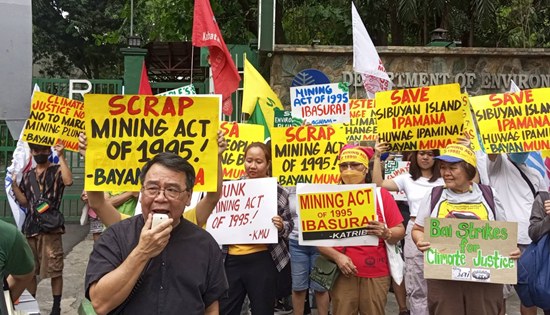National minorities join
2023 Global Climate Strike
Sandugo: ‘Time to
replace Mining Act of 1995 with People’s Mining Bill’

Press Release
March 3, 2023
QUEZON CITY – Today
marks 28 years since Republic Act 7942, or the Mining Act of 1995,
was passed. In a demonstration held at the central office of the
Department of Environment and Natural Resources (DENR), Sandugo -
Movement of Moro and Indigenous Peoples for Self-Determination
joined various sectors in calling for the repeal of the said law.
“Sa loob din ng 28 taon na
ito, hindi umalwan ang buhay ng mga katutubo sa lugar na kung saan
may mga minahan,” said Eufemia Cullamat, Sandugo spokesperson. “Sa
halip, kami ay nagkawatak-watak dahil sinisira at winawasak ng mga
minahan ang mga lupang ninuno.” [In the past 28 years, the lives of
indigenous communities in mining areas have not improved. Rather, we
have been torn apart as mining continuously ravages our ancestral
lands.]
Sandugo cites the key role
of the DENR in greenlighting environmental degradation through the
Mining Act of 1995, claiming the department has placed profit over
the people’s welfare. “Ito pa ang nagbebenta ng aming mga lupang
ninuno, nagbibigay ng Environmental Compliance Certificate (ECC)
kahit walang malinaw na FPIC [free, prior, and informed consent] o
pahintulot ng mga katutubong komunidad!” [The DENR itself is selling
out our ancestral lands, issuing ECCs without securing FPIC, or the
free, prior, and informed consent of indigenous communities.]
Cullamat further lamented
the impact of large-scale, corporate mining on indigenous
communities’ agricultural practices and food security. “Kung dati ay
nakakapagtanim kami ng palay dalawang beses sa isang taon, ngayon ay
hindi na dahil hindi na balanse ang tag ulan at tag init na syang
bumubuhay sa mga pananim.” [Before, we would harvest grain twice a
year; this is no longer possible because the climate that nourishes
our crops has been altered.]
The demonstration is part
of the Global Climate Strike, a globally-coordinated mass action
spanning nearly a hundred countries which demands urgent action on
the worsening climate crisis. The mining sector represents an
estimated 4 to 7 percent of greenhouse gas emissions globally. Up to
half of copper, gold, iron ore, and zinc mining is located in areas
with high water stress, greatly altering the lifeways of
communities. In the Cordillera for example, a long history of mining
has seen villages lose irrigation for rice production, as well as
massive landslides and ground collapse. Since mining requires large
amounts of water for its operations, mining companies in the area
have privatized water sources, making life more difficult for
indigenous and peasant communities.
Sandugo supports the
passage of House Bill (HB) 259, or the People’s Mining Bill, which
moved forward last month with the approval of the House Committee on
Natural Resources. The bill seeks to make important shifts in the
mining industry, among these the encouragement of foreign companies
to reinvest rather than repatriate profits to their home countries,
and the overall reorientation of the mining industry towards the
development of domestic industries. The movement welcomes the bill’s
ban on prime agricultural lands and watershed areas, sacred
indigenous sites, small island ecosystems, and areas specified for
food production and fishing. Sandugo also laud’s the bill’s intent
to ban firms and conduits with a poor track record.
“Ang mga nasirang
kabundukan, buhay at kabuhayan ay hindi na maibabalik pa,” says
Cullamat. “Nararapat lamang palayasin at pagbayarin ang mga
mandarambong at lumapastangan sa kalikasan. Kailangan natin itong
tuloy tuloy na ipaglaban sa pamamagitan ng ating mahigpit na
pagkakaisa at pagtutulungan.” [The destruction that has already
ravaged our mountains, lives, and livelihoods is irreversible. It is
only right to banish and punish the greedy entities that have
pillaged our environment. We need to be relentless in our fight, by
supporting each other and standing in solidarity.]